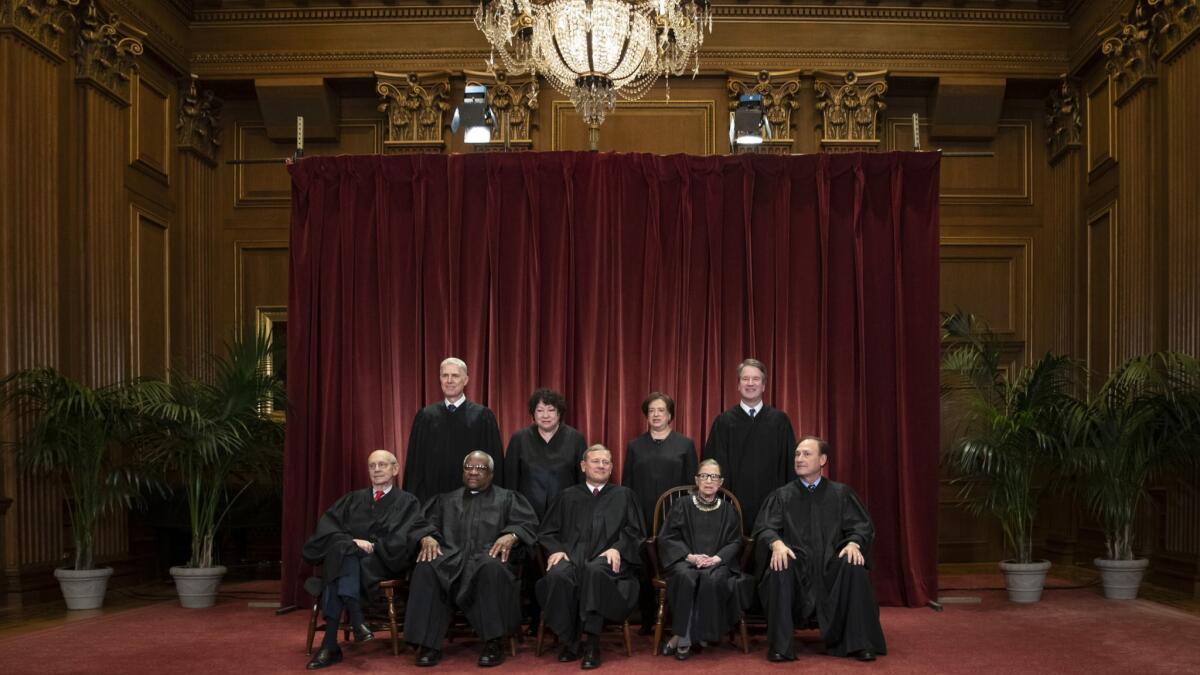Editorial: Some court decisions deserve to be overruled. Roe vs. Wade isn’t one of them

- Share via
The Supreme Court’s decision this week to overrule one of its prior decisions is attracting attention not because of its unexciting holding — that a state can’t be sued in the courts of another state — but because of a forceful and timely dissent from the court’s four Democratic appointees.
Writing for himself and Justices Ruth Bader Ginsburg, Sonia Sotomayor and Elena Kagan, Justice Stephen G. Breyer said that needlessly overturning previous decisions threatens the stability of the law. He warned his colleagues that the court should cast aside previous rulings “only when the circumstances demand it.”
Breyer’s dissent has created a minor sensation, but not because of his comments about the importance of consistency in the law. Conservative justices have said similar things. It’s what appears between the lines that has attracted attention: an implicit plea to the court’s conservatives not to overturn Roe vs. Wade, the landmark 1973 decision legalizing abortion.
The fight to overrule Roe must not succeed. A woman’s right to have an abortion is too important and must be protected.
Breyer’s warning is timely. It comes against the backdrop of efforts by states to enact ever-more-restrictive anti-abortion laws. On Wednesday, Alabama Gov. Kay Ivey signed a patently unconstitutional bill that bans abortion at all stages of pregnancy except to save the life of the mother. Even the bill’s sponsor acknowledges that it was passed “so that we can go directly to the Supreme Court to challenge Roe v. Wade.”
The fight to overrule Roe must not succeed. A woman’s right to have an abortion is too important and must be protected.
But to be clear, just because Roe deserves to be preserved, that doesn’t mean that the court should treat all precedents as sacrosanct. Sometimes a decision is such an affront to the Constitution that it cries out to be overruled.
That was true of Plessy vs. Ferguson, the 1896 decision blessing legal racial segregation that was overturned in Brown vs. Board of Education in 1954. Another example was the court’s outrageous 1986 decision in Bowers vs. Hardwick, upholding Georgia’s criminal statute against sodomy on the offensive rationale that the Constitution didn’t protect “a fundamental right to engage in homosexual sodomy.” Bowers was overruled 17 years later in Lawrence vs. Texas.
Most recent discussions of the importance of adhering to precedent have arisen in the context of abortion. Unlike some other landmark decisions, Roe continues to be divisive decades after it was handed down.
It was during questioning by the late Sen. Arlen Specter (R-Penn.) about Roe that John G. Roberts Jr., then seeking confirmation as chief justice, said in 2005 that overruling a precedent causes a “jolt to the legal system.” He was right. But Roberts declined to endorse Specter’s characterization of Roe as a “super-duper precedent.” Subsequent Republican Supreme Court nominees have also acknowledged that Roe is a precedent worthy of respect but haven’t promised to uphold it.
There are important reasons, however, for the court to adhere to that precedent in addition to the fact that it was rightly decided in the first place.
Among the traditional reasons not to overrule a prior decision is if it has been relied on by a significant number of Americans whose lives would be disrupted if it were overruled. A relatively small number of people have relied on the precedent overruled this week. By contrast, millions of American women have relied on the right to abortion announced in Roe.
Enter the Fray: First takes on the news of the minute »
The court made that clear in its 1992 decision in Planned Parenthood vs. Casey, which upheld the “essential holding” of Roe. The majority wrote that “for two decades of economic and social developments, [people] have organized intimate relationships and made choices that define their views of themselves and their places in society, in reliance on the availability of abortion in the event that contraception should fail. The ability of women to participate equally in the economic and social life of the nation has been facilitated by their ability to control their reproductive lives.”
Supporters of Roe worry that conservatives on the court, while paying lip service to the idea that precedents deserve respect, will nevertheless find a way to overrule Roe explicitly or chip away at it until it is substantially weakened. There’s cause for that concern.
Last year, the conservative majority on the court overturned a 41-year-old decision holding that government workers unions could require nonmembers to a pay a fee to cover the cost of collective bargaining. In her dissent, Kagan accused the majority of ignoring the usual criteria used to decide whether a decision should be reversed. The majority overruled the previous decision, she said, simply “because it wanted to.”
If conservative justices did the same with Roe, they wouldn’t just be harming women; they also would be confirming cynics in their view that the court is just another political institution.
Follow the Opinion section on Twitter @latimesopinionand Facebook
More to Read
A cure for the common opinion
Get thought-provoking perspectives with our weekly newsletter.
You may occasionally receive promotional content from the Los Angeles Times.










